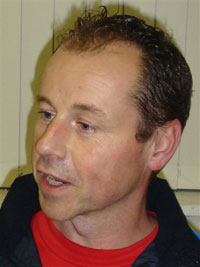25 October 2007 Edition
Matt Treacy

Kicking with the other foot
EDWIN POOTS, the DUP minister with responsibility for, among other things, sport, addressed the GAA Ulster Council last Saturday. Poots has not endeared himself over his stance regarding the proposed Irish Language Act so there was considerable interest in his becoming the first unionist minister to officially attend a GAA meeting.
Poots did refer to the Irish Language Act when he said that he recognised the importance of Irish to the GAA but fell back on his claim that he was opposed to the legislation on financial grounds. That apart, he did make some interesting references to the relationship between the GAA and the unionist community.
Specifically, Poots urged that the association try to make Gaelic games more attractive to unionists. How exactly that might be accomplished, he did not say, but I suppose it is a timely debate given the recent incident involving Lisnakea Emmets and Fermanagh player Darren Graham.
I have no idea whether Graham is a unionist politically but he is a Protestant and the perception was that the abuse he suffered was because of his religion, although again, strictly speaking, there were other factors involved – none of which, it has to be said, is any excuse for the type of treatment that he says he was subjected to.
GAA members do need to recognise that there is an issue. Although sport has such complicated cultural, historical and indeed political nuances that there is no easy fix to the problem as to how you get people involved. Obviously, Poots was specifically referring to the GAA in the Six Counties – and the much more stark realities of community division there – but it has also been an issue in the past in the rest of the country.
Even where religion has long ceased to be an issue or a communal identifier, Protestants traditionally have not played Gaelic football or hurling. In my family’s old club in Dublin it was so rare that the only known non-Catholic was referred to affectionately as ‘The Prod’! I don’t think he took offence but sensitivity was not a big thing anyway.
I also know Church of Ireland people who are now keen followers of hurling and football and whose younger family are closely connected to clubs but who felt that they were not welcome in the 1950s or the ‘60s. Part of that had to do with the different way Catholics and Protestants spent Sundays but part of it certainly was based on hostility, probably largely political and social rather than sectarian. That hostility has gradually abated but how much longer will it take in North Antrim than North County Dublin?
The biggest selling point of the GAA is obviously the games themselves and there is no reason why they ought not to attract people from the unionist community. The thing is, of course, that the clubs are an intrinsic part of the nationalist community and it is difficult to see large numbers of people from the other community joining. The other alternative is that new clubs are established but there are many obvious problems connected to that. The strict sectarian division within soccer is proof of that.
There is also the fact that the GAA is far more than a sports organisation. It was founded as part of a cultural revolution to resist the threatened anglicisation of the country in the last quarter of the 19th Century and was intimately connected to the political and military struggle for Irish freedom. There are those who would like to forget that but it is not possible, especially given that national independence and sovereignty are not yet a reality, in either part of the island.
The question, then, is can people from the unionist tradition become a part of the GAA given that historical background? Could a Tyrone unionist, for example, find another red hand to be passionate about, without paying heed to the other aspects of the association? Could a Tyrone unionist indeed feel comfortable in Healy Park with the flag and the anthem?
Not questions we are much given to ponder but ones that will need to be addressed if there is to be any prospect of what Poots (whether genuinely or not is another issue) urges on the GAA. Personally, I believe the way to go is through promoting the games but without making any concessions with the external symbolism and traditions of the association.
Many people from what would then have been considered a unionist background became involved in the GAA, Conradh na Gaeilge and other cultural organisations in the past. Many of them then became republicans but even those who did not had embraced aspects of Irish culture that by tradition they ought to have been hostile to.
So Poots’s challenge is one that ought to be taken up. Not because he raised it, or on his terms, but as something that is worth doing for its own sake. How best to do so I confess to having only the vaguest of notions. Perhaps the schools would be the best place to start? It would be interesting to see what the response would be, for example, if the Ulster Council was to offer to provide hurling, football and camogie coaches for Protestant schools.


